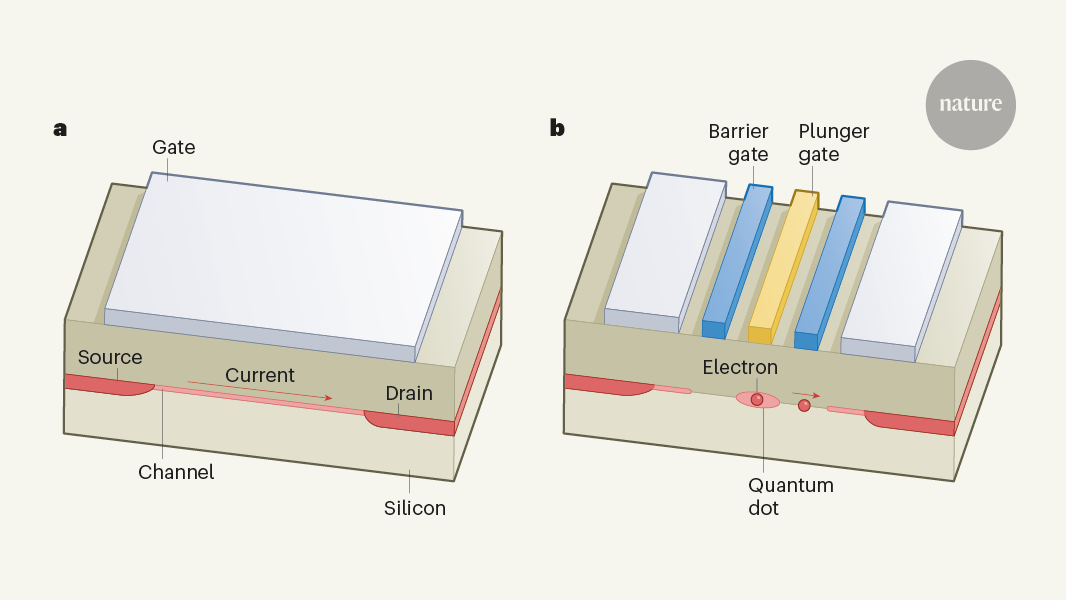Intel Develops Large-Scale Quantum Computing Microchips, a Significant Step Towards Practical Quantum Computers
Core Concepts
Researchers at Intel have used semiconductor technology to fabricate large-scale silicon quantum bits (qubits) on a 300mm wafer, a crucial step towards building practical quantum computers capable of solving real-world problems.
Abstract
The article discusses a significant advancement in quantum computing made by researchers at Intel. Quantum computers have the potential to outperform classical computers, but realizing a general-purpose quantum computer requires millions or even billions of qubits.
The key highlights are:
Quantum computers with "quantum advantage" have been demonstrated, but only with tens or hundreds of qubits.
To solve practical problems, quantum computers need millions or billions of qubits.
Semiconductor technologies have put billions of transistors on classical computer chips, leading researchers to wonder if similar techniques could be applied to quantum computers.
The Intel team has used semiconductor fabrication technology to create silicon qubits on a 300mm wafer, the largest chip substrate used in the semiconductor industry.
These qubits were fabricated with a high success rate and impressive uniformity, representing a significant step towards building quantum computers at a scale capable of tackling real-world applications.
Intel brings quantum-computing microchips a step closer
Stats
Quantum computers need millions or even billions of qubits to solve practical problems.
The Intel team fabricated silicon qubits on a 300mm wafer, the largest chip substrate used in the semiconductor industry.
Quotes
"Quantum computers can outpace classical computers, but so far this 'quantum advantage' has been shown only for certain algorithms, and with tens or hundreds of quantum bits (qubits)1–3."
"To realize a general-purpose quantum computer that can solve practical problems, millions or even billions of qubits are needed4."
Key Insights Distilled From
by Ruoyu Li at www.nature.com 05-01-2024
https://www.nature.com/articles/d41586-024-01208-z
Deeper Inquiries
What are the key technical challenges that need to be overcome to scale up quantum computers to millions or billions of qubits?
Scaling up quantum computers to millions or billions of qubits presents several key technical challenges that need to be addressed. One major challenge is qubit connectivity, ensuring that each qubit can interact with all other qubits in the system. This requires designing architectures that allow for long-range qubit interactions while minimizing errors. Additionally, qubit coherence, the ability of qubits to maintain their quantum state for a sufficient amount of time, is crucial for large-scale quantum computing. Improving qubit coherence times will be essential to perform complex computations on a quantum computer with millions of qubits. Furthermore, error correction is vital as quantum systems are prone to errors due to environmental noise and imperfections in hardware. Developing robust error correction techniques that can efficiently detect and correct errors in a large-scale quantum system is a significant challenge that needs to be overcome.
How do the performance and error rates of the silicon qubits fabricated by Intel compare to other qubit technologies, and what are the tradeoffs?
The silicon qubits fabricated by Intel have shown promising performance and low error rates compared to other qubit technologies. Intel's use of semiconductor technology to fabricate silicon qubits on a 300-millimeter wafer has demonstrated high success rates and impressive uniformity. This achievement represents a significant step towards building quantum computers of sufficient scale for practical applications. In terms of performance, silicon qubits have the potential for scalability due to existing semiconductor manufacturing processes, which could enable the production of millions or billions of qubits. Additionally, silicon qubits have shown relatively low error rates, which is crucial for the reliability of quantum computations. However, there are tradeoffs to consider, such as the challenge of achieving long coherence times in silicon qubits compared to other qubit technologies like superconducting qubits. Balancing performance, error rates, scalability, and coherence times will be essential in determining the most suitable qubit technology for large-scale quantum computing.
How might the development of large-scale quantum computers impact fields beyond computing, such as materials science, chemistry, or finance?
The development of large-scale quantum computers is poised to have a transformative impact on various fields beyond computing, including materials science, chemistry, and finance. In materials science, quantum computers could revolutionize the discovery and design of new materials by simulating complex quantum systems with unprecedented accuracy and speed. This could lead to the development of advanced materials with tailored properties for specific applications, such as superconductors or catalysts. In chemistry, quantum computers could enable the simulation of chemical reactions and molecular structures with high precision, facilitating the discovery of new drugs, materials, and sustainable energy solutions. Moreover, in finance, quantum computers could revolutionize optimization problems, risk analysis, and portfolio management by solving complex mathematical models efficiently. This could lead to advancements in algorithmic trading, asset pricing, and financial risk assessment. Overall, the development of large-scale quantum computers has the potential to drive innovation and breakthroughs in various fields, offering new opportunities for scientific discovery and technological advancement.
0
